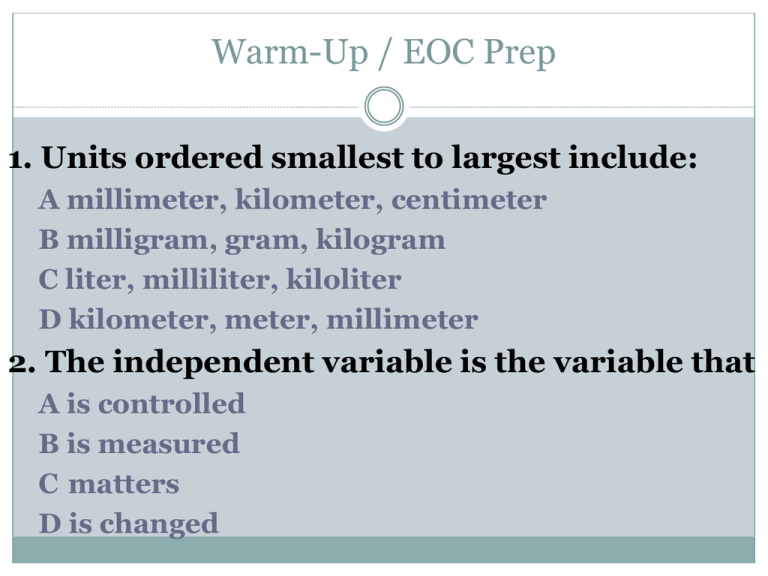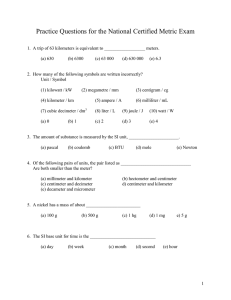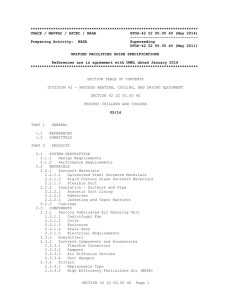Final Review Scientific Method
advertisement

Warm-Up / EOC Prep 1. Units ordered smallest to largest include: A millimeter, kilometer, centimeter B milligram, gram, kilogram C liter, milliliter, kiloliter D kilometer, meter, millimeter 2. The independent variable is the variable that A is controlled B is measured C matters D is changed Turn in the Final Exam Review packet assigned over break. If not, TOMORROW is the last day to turn it in. It will be marked down for being late. This is a test grade. Take it seriously! If you borrowed a textbook, return it before Friday!! Agenda Warm-Up Explain “Think Fast” Notes- Scientific Method and Safety Review worksheets Clean-Up Cool-Down EOC Review DAY 1: SCIENTIFIC METHOD Objective 1.02-Scientific method Be able to read line and bar graphs Materials Graduated cylinder, eyedropper, bunsen burner, watch glass, petri dish, tongs, hot plate, triple beam balance, beaker Objective 1.01-Lab Safety When heating a solution in a test tube, a student should point the test tube away from their face and wear goggles Measurementmicrometermillimetercentimetermeter 10 cm = .1 m = 100 mm Lab Safety • Glassware Safety • Sharp Instrument Safety • Fire and Heat Safety • Animal Safety • Electrical Safety • Chemical Safety • Eye and Face Safety • Proper Dress 1. How should you pick up a piece of hot glassware? A. bare hands B. with heat-resistant gloves C. with the sleeve of your shirt D. With a spatula 2. How should you hold a test tube containing a chemical? A. pointed away from your face B. pointed at your eye C. held right up to your nose D. very close to your partner’s face 3. You should report a cut in your skin, glass breakage, or a chemical spill A. after the problem is handled B. never C. immediately D. after you write down what happened • 4. When you are done with an experiment, how should you dispense of any chimicals used? A. mix them all up in a waste container and dump them in the trash B. pour them all down the sink while running the water to dilute C. Follow the instructions given to properly dispose of the particular chemicals D. Mix the chemicals in a flask and heat the mixture until it evaporates into the air • 5. What is the best way to read the volume of a liquid in a graduated cylinder? A. read the level of the liquid going up the side of the cylinder B. make sure five people in the lab read it before you write it down C. Glance at the cylinder and write down the first number you see D. read the level of liquid at the middle of the meniscus at eye level Objective 1.01-Scientific Method 1. Make an observation 2. Identify the problem/question 3. Form a hypothesis 4. Design an experiment 5. Perform an experiment 6. Analyze Data 7. Make conclusions Objective 1.01 Scientific Method • 1. Observation: Observe birds in flight • 2. Question: How do birds fly? • 3. Hypothesis: The wing designs of birds catch air differently • 4. Experiment: Make and fly different designs of paper airplanes to test the hypothesis • 5. Analyze Data: take notes on flight patterns of paper airplanes. Create a data table on how each airplane flies. • 6. Conclusion: The size and shape of the wing gives lift to the bird Scientific Method • Vocabulary • 1. Independent variable-variable that is changed • 2. Dependent variable-variable that is measured or counted-changes in response to the independent variable • 3. Control-things the investigator keeps in control in order to keep them the same for all samples • 4. hypothesis-statement that gives the best possible response to the question and should be based on already known facts (educated guess) Scientific Method Quantitative Data: numbers Ex: 500, 6, ten Qualitative Data: no number Ex: brown, big, tall Prediction- forecast (educated guess) of the possible results of events 1. A judgment based on data gathered in an experiment is… A. a skill B. a conclusion C. a hypothesis D. an observation 2. A forecast of possible or future events is a/an A. Analysis B. Predication C. Hypothesis D. Observation 3. The end products of your investigation or experiment are… A. B. C. D. Results Guesses Predictions Questions Objective 2.01-pH and water Water dissolves most molecules and ions pH scale = 1-14 1-6 = acids-the lower the pH, the stronger the acid 7 = neutral 8-14 = bases-the higher the pH, the stronger the base Objective 2.01-microscopes Total magnification = eyepiece x objective Eyepiece = 10x Objectives = 10x and 40x Greatest possible magnification = 40ox (10 x 40) Under the microscope, letters get put upside down and backwards Objective 2.01-microscopes Objective 2.01-microscopes








